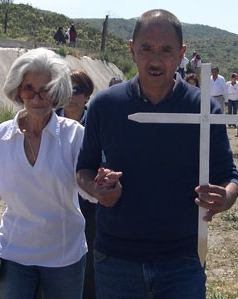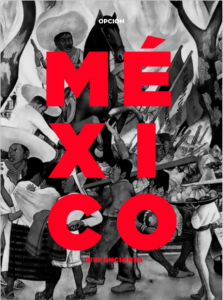
Doctor of Social Science with a specialization in Sociology from the Colegio de México. Carolina is currently holding a professorship Conacyt at the Centro de Investigaciones y Estudios Superiores en Antropología Social (CIESAS-DF), where she is researching the justice given to relatives of victims of disappearance due to the war on drugs. Amongst her research interests are the victim’s social movements, access to justice, and the construction of social representation around violence. Carolina advises the ‘Association United for the Missing of Baja California’ since 2008 and the ‘Movement for Our Disappeared’ in Mexico since 2015.
Academic article: La desaparición de los 43 normalistas en México: una aproximación al análisis crítico del discurso en la prensa
In this article, a critical analysis of the press discourse in the covering of the disappearance of 43 young students in Guerrero (México) in September 2014 is suggested. For that purpose, the corpus of 2107 journalistic documents was explored over a period of three months, following the newspapers Reforma and La Jornada; the purpose of this exploration was to identify the discourse strategies used in the press to report on the fact, from the lexical frequency and the nominal phrasing occurrence. Four strategies were specifically identified: negation, and neutralization, which is used to hide the State responsibility in the violent acts, and the historicization and accreditation as part of the dissident discourse. All of the strategies are oriented to the dispute of the lexical fields that give sense to the forced disappearance and the violation of human rights.
Academic article: The Labyrinth of Shadows: Disappear in the Context of Mexico’s Drug War
This article presents an analysis of the phenomenon of missing persons understood as a socio-historical fact that has been substantially transformed in the last two decades in Mexico, both in practice and discourse, passing from a Dirty War context to the Drug War. Forced disappearances, previously explained within the framework of political repression, today offer less clarity on the motives and actors associated with the phenomenon. This document is the result of a qualitative fieldwork over five years in the city of Tijuana, and a literature review that includes texts from the early 90’s and newspaper archives. The information collected indicates that current symbolic disputes in the field of forced disappearances, under the pressure exerted by victims’ movements, are expanding the frames of recognition around the phenomenon of missing persons in the context of criminal violence.
ACADEMIC ARTICLE: Looking for el Pozolero’s Traces: Identity and Liminal Condition in the War on Drug’s Disappearances
The aim of this paper is to demonstrate the power of symbolic ritual actions performed by relatives of missing persons on the land of el Pozolero, to give them a place in the social world. The construction of community mourning is analyzed in the margins of social structure (liminality), and the process by which it provides new frameworks to interpret and make sense of disappearances in the War on Drugs.
JOURNALISTIC ARTICLE: Itinerarios de Búsqueda
De unos años a la fecha México ha acumulado un inventario de fosas, entierros clandestinos y formas irregulares de inhumación de cuerpos, que resultan ser un atentado no sólo contra quienes han sido enterrados de manera indigna. Una primera pregunta que debemos hacernos es si estamos preparados para encontrar. Y esta pregunta está dirigida tanto a los familiares de personas desaparecidas como a las autoridades y a la sociedad en general. En este artículo propongo algunas reflexiones en torno a esta problemática a través de mi trabajo etnográfico a pie de fosa de los últimos años.
MULTIMEDIA
Fosas clandestinas: violencia, rupturas y lucha por la verdad. Entrevista con Carolina Robledo
ETHNOGRAFÍA EN TIEMPOS DE COVID- ENTREVISTA CAROLINA ROBLEDO

